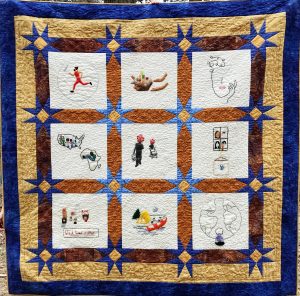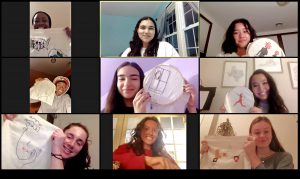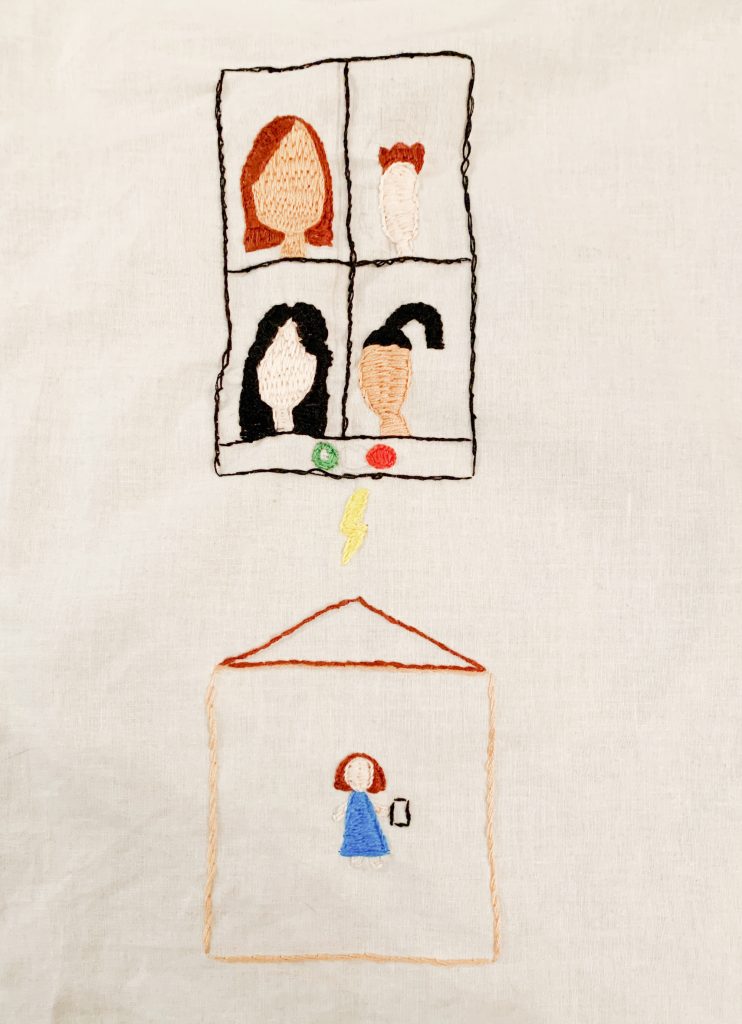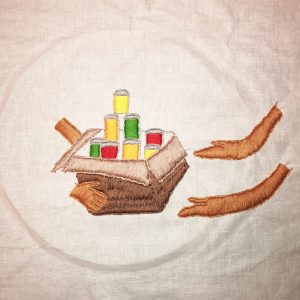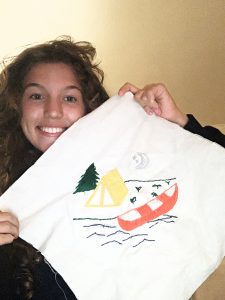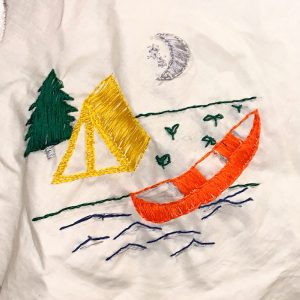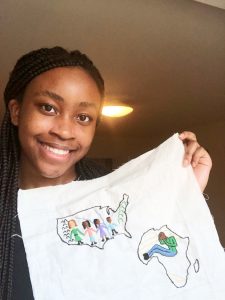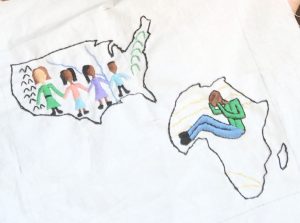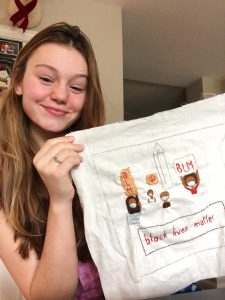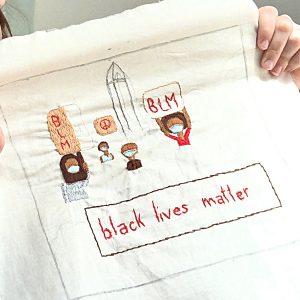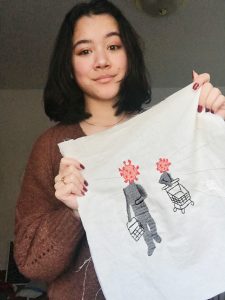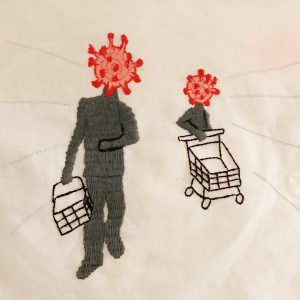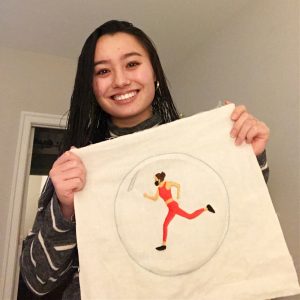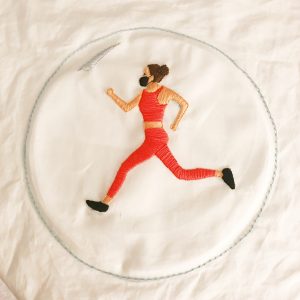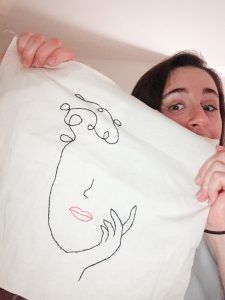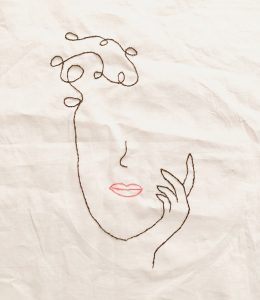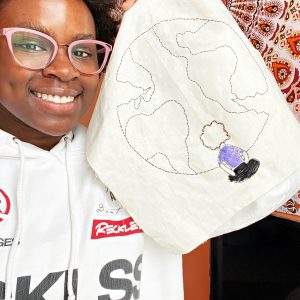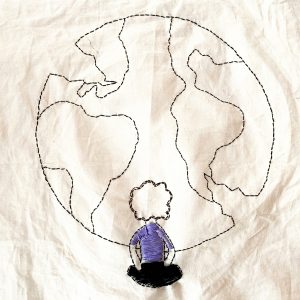The Arlington COVID Quilt
Background
The blocks in this quilt describe the impact of the pandemic on nine students at the Wakefield High School in Arlington Virginia. All nine are members of the Girl Up chapter at Wakefield.
The project began in late 2019, when we put the Wakefield students in touch with the girls in Zimbabwe who are making Clean Girl soap under the direction of our partner in Zimbabwe, Women Advocacy Project. The Girl Up coordinator at the time, Claire Brophy, made a short video about Wakefield which she shared with Evelyn Sachiti, who heads the soap-making team in Chitungwiza, Harare. After visiting Zimbabwe in late 2019 we made a second video about Evelyn and her team. Evelyn and Claire became close friends and exchanged emails.
 Our hope had been that this would lead to active collaboration and the Wakefield students even expressed interest in making their own Clean Girl soap in the US, with profits going to the girls in Zimbabwe. We had a soap trainer lined up. Then the pandemic broke. Instead of giving up the two groups decided to use embroidery to describe their experience of COVID-19. The Zimbabwe girls completed their squares in the fall.
Our hope had been that this would lead to active collaboration and the Wakefield students even expressed interest in making their own Clean Girl soap in the US, with profits going to the girls in Zimbabwe. We had a soap trainer lined up. Then the pandemic broke. Instead of giving up the two groups decided to use embroidery to describe their experience of COVID-19. The Zimbabwe girls completed their squares in the fall.
We also commissioned squares from women who lost their fathers during the conflict in Nepal and have turned stitching into a fine art.
The three sets of squares offer a fascinating contrast in style and subject matter. Of the three countries – Nepal, Zimbabwe and the US – the US has suffered by far the most deaths and sickness. But it is the squares from Zimbabwe that offer the bleakest images, about the government efforts to enforce the lock-down. The squares from Nepal are more reflective, and dwell on the separation and isolation caused by COVID-19. This has been devastating in a society built around the community and families.
 The Wakefield squares offer the perfect complement. They too dwell on separation and isolation, but the stress is less apparent than in Nepal. Some designs are certainly poignant. Kate uses her square (above) to express the discomfort she feels being around other people in crowded places like the grocery store. Anne’s square describes how she depends on running to “keep her sane” but notes sadly that running has also become very lonely. Stephanie thinks about her father in Nigeria, missing his family in the US and deeply anxious about the scary reports coming from the US.
The Wakefield squares offer the perfect complement. They too dwell on separation and isolation, but the stress is less apparent than in Nepal. Some designs are certainly poignant. Kate uses her square (above) to express the discomfort she feels being around other people in crowded places like the grocery store. Anne’s square describes how she depends on running to “keep her sane” but notes sadly that running has also become very lonely. Stephanie thinks about her father in Nigeria, missing his family in the US and deeply anxious about the scary reports coming from the US.
But another less strained theme emerges from the Wakefield squares. Being freed from the hustle and bustle of school and social pressures has enabled the nine artists to reflect about the things that really matter, like their families, their friends and even historic developments like the Black Lives Matter movement. Occasionally, there is regret, as when Ainsley realizes she will be deprived of a homecoming by the pandemic. But the artists understand that others have it far worse. Without exception, they count their blessings and express compassion for others who are less well off.
 The three sets of COVID squares are also a reminder of the therapeutic power of stitching. All twenty-four artists in the three countries helped each other through the dark days of isolation and pushed each other to be creative. Sofia speaks for many when she writes: “The project has been calming for me.”
The three sets of COVID squares are also a reminder of the therapeutic power of stitching. All twenty-four artists in the three countries helped each other through the dark days of isolation and pushed each other to be creative. Sofia speaks for many when she writes: “The project has been calming for me.”
The girls in Zimbabwe and Nepal learned to stitch while working on previous quilt projects with AP, but this was the first time for most of the Wakefield artists. It started on a good-humored note with some online training from Bobbi Fitzsimmons, a well-known quilter and member of the AP Board. Bobbi is deeply impressed by the quality of the Wakefield squares that have emerged.
The artists are also delighted with the result so far. Stephanie says: “I’m proud of myself! I never thought I could do this.” Stephanie credits the project with introducing her to new friends in the US and expanding her knowledge of Africa. She was born in Nigeria and brought up in the US, giving her a unique multicultural perspective. By introducing her to Evelyn in Zimbabwe, the COVID quilt project has given Stephanie a new friend and a deeper understanding of the continent she came from.
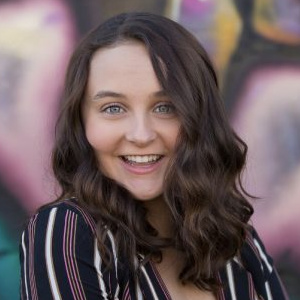
Abby Stuckrath helped the Wakefield artists explain their designs through wonderful podcasts.
Abby Stuckrath, a student at American University who volunteered at AP over the Fall, interviewed the Wakefield artists about their squares and posted them as podcasts on her blogging page. This is the first time we have added audio to our quilt pages and it will hopefully not be the last. Abby’s fine interviews are another example of the way quilting can offer talented people a creative outlet.
The blocks were assembled into a finished quilt by Beth Suddaby, a well-known quilter in Northern Virginia who led the team that assembled the River Gypsy quilt from Bangladesh, one of the best designed advocacy quilts ever made.
This project quickly attracted attention. Two of the artists, Layla and Stephanie, were featured with Beth on the local television news. The artists will unveil their quilt at an exhibition in Wilmington and hope to show it at their school, and at vaccination centers. They have also developed a strong bond with the Zimbabwe girls who worked on their own COVID blocks. The two groups meet by Zoom every Saturday to discuss everything from jewelry to food.
AP is proud to have supported such a creative initiative at such a difficult time. Telling our story is a form of resistance and empowerment in the face of crisis. (March 25, 2020).
Email Layla (Lkherbouch@gmail.com) and Stephanie (stef_achugs@icloud.com) for more information. Our thanks to Humanity United for supporting this project. (January 1, 2021)
Artists and blocks
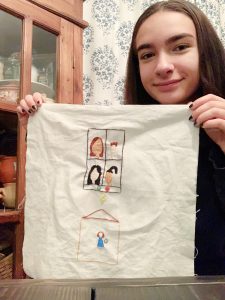 Cyber-Friends by Sofia Reecer
Cyber-Friends by Sofia Reecer
Sofia’s square shows her keeping in touch with her friends by Facetime during the pandemic: “In normal times I like to spend as much time as possible with my friends. They’re like an extension of my family to me.
“My square (shows) my house as really small. I am inside holding a phone. Above – connected by a lightening bolt of electricity to represent technology – is a close-up of my phone screen. I’m Facetiming with friends. I do have a few friends who live far away in other states. It’s been interesting to see how long-distance friendships and those closer to home have been put on the same level.”
The pandemic has changed Sofia and her community. “I think I’ve probably got a little less dramatic and learned that things that seemed initially daunting are not quite as bad as they seem. I’ve probably become a little more resilient.” The pandemic has also bought Sofia’s community together: “There’s a woman up the street who organizes a food drive. Her house is a drop-off site for donations. It’s really cool to see people participating and coming together like that.”
Sofia has enjoyed the embroidery project. “It was really calming for me. I’d never tried it before. I really liked this project. That was a kind of new entry-point. It really opened up for me.”
Working with the Zimbabwe girls, and seeing their strong designs, has helped Sofia put her own challenges into perspective. “A teenage girl in America not being able to Facetime her friends. It would be easy to get down about that, but then it’s also important to realize there are other things going on the world and even in my community as well. You realize that there other things going on that are bigger than you, I guess.”
“The embroidery project was really calming for me”
Listen to Sofia’s podcast interview
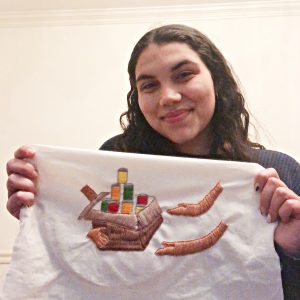 Community by Layla Kherbouch
Community by Layla Kherbouch
Layla’s square is about the importance of giving. The hands on the right are passing over a box of canned food to a second set of hands.
Layla – one of two project coordinators – has been particularly upset by the financial insecurity and instability caused by the pandemic. She herself was laid off from her part-time job at a local pizza restaurant, but considers herself remarkably fortunate compared to others: “My parents were able to stay in their jobs and we were able to stay in our house. We felt really fortunate and just wanted to help out other members of the community who were not as lucky.”
The family signed up for a local initiative to make snack packs for kids and went to Costco to stock up on popcorn, Goldfish, raisins, nuts and healthy snacks: “We would donate whatever we could – canned food, meals, snacks – that not only help with food security but also maintain that sense of community that is very strong in Arlington. We wanted to make sure that in that time of isolation there is someone who wants to help out.”
They put the packs together while watching TV and doing other family things. Some people worry that it takes too much time and effort to be charitable, but that’s not so says Layla: “It’s not that hard to incorporate (giving) into your life-style. I just want people to understand the importance of giving back and putting your experience into the context of the world and other issues that may be impacting people on a deeper level.”
“We wanted to make sure that in a time of isolation there is someone who wants to help out.”
Listen to Layla’s podcast interview

